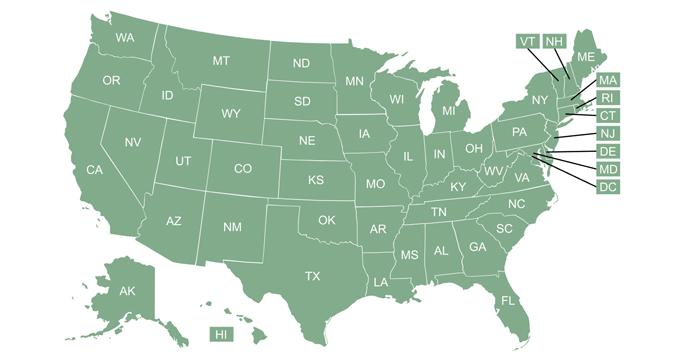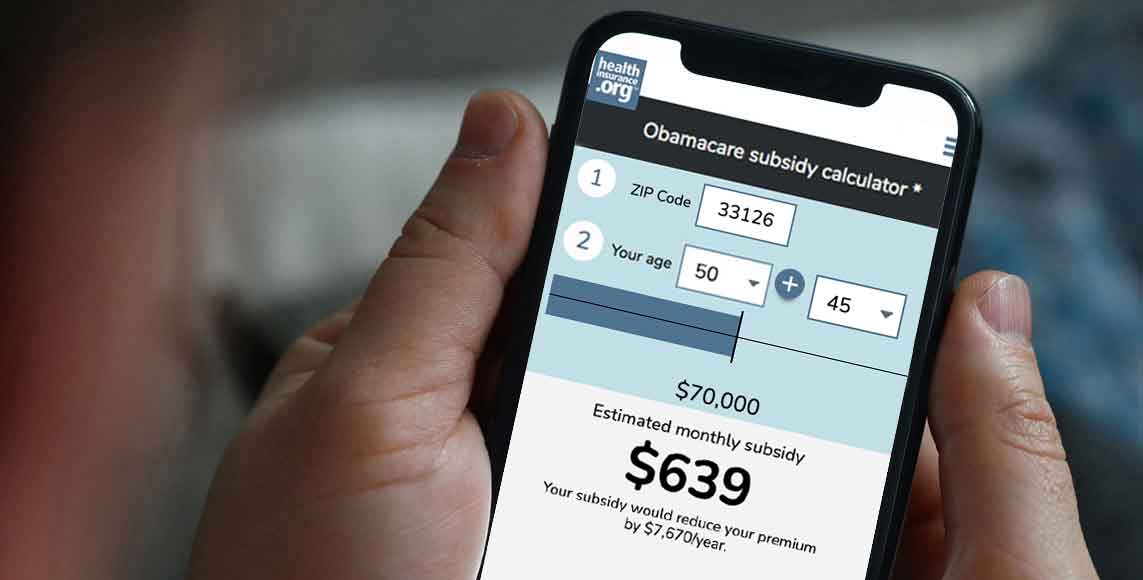
Key takeaways
- If you lose your employer-sponsored insurance (ESI) because you’ve lost your job, you’ll qualify for a special enrollment period.
- If you’re losing your job, you have 60 days to decide whether to use COBRA to temporarily keep your job-based coverage.
- Consider factors such as ACA subsidies and out-of-pocket already spent when deciding between COBRA and marketplace enrollment.
- Your income determines whether you’ll be eligible for health insurance premium subsidies.
- Subsidized marketplace health insurance could keep you covered if you’re nearing Medicare eligibility.
Most Americans under the age of 65 get their health insurance from an employer. This makes life fairly simple as long as you have a job that provides solid health benefits: All you need to do is enroll when you’re eligible, and if your employer offers a few options from which to choose, pick the one that best fits your needs each year during your employer’s annual enrollment period.
But the downside to having health insurance linked to employment is that losing your job will also mean losing your health insurance, adding stress to an already stressful situation.
The good news is that you’ve got options — probably several, depending on the circumstances. Let’s take a look at what you need to know about health insurance if you’ve lost your job and are facing the loss of your employer-sponsored health coverage.
Can I enroll in self-purchased insurance as soon as I’ve lost my job?
If you’ve lost your job-based health insurance, you do not have to wait for the next annual open enrollment period to sign up for a new ACA-compliant plan. You’ll qualify for your own special enrollment period due to the loss of your employer-sponsored health plan.
This will allow you to enroll in a plan through the marketplace/exchange and take advantage of the subsidies that are bigger than ever, thanks to the American Rescue Plan.
If you enroll prior to your coverage loss, your new plan will take effect the first of the month after your old plan ends, which means you’ll have seamless coverage if your old plan is ending on the last day of the month.
Your special enrollment period also continues for 60 days after your coverage loss, although you’d have a gap in coverage if you wait and enroll after your old plan ends, since your new plan wouldn’t take effect retroactively.
If you’re in that situation, you might find that a short-term health plan is a good option for bridging the gap until your new plan takes effect. Short-term plans won’t cover pre-existing conditions and are not regulated by the Affordable Care Act (ACA). But they can provide fairly good coverage for unexpected medical needs during a temporary window when you’d otherwise be uninsured.
COBRA (or state continuation) versus self-purchased coverage
Alternatively, if COBRA is available, you have 60 days to decide whether you want to take it or not. You can use this window as a bit of a cushion between your old coverage and your new coverage, because COBRA takes effect retroactively if and when you elect to use it. So if you’ll have a one-month gap between your job plan ending and your new plan starting, you could elect COBRA if you end up with medical needs during that month. The coverage would seamlessly start when your old plan would have ended, avoiding any gap in coverage as long as you pay all COBRA premiums that are due.
If COBRA (or state continuation coverage) is available, your employer will notify you and give you information about what you’ll need to do to activate the coverage continuation, how long you can keep it, and how much you’ll have to pay each month to keep the coverage in force.
If you rely on COBRA after leaving your job (instead of transitioning to a self-purchased plan in the marketplace), you’ll have a special enrollment period when the COBRA subsidy ends. This will allow you to transition to an individual/family plan at that point if you want to.
COBRA coverage vs individual-market health insurance
Here’s what to keep in mind when you’re deciding between COBRA and an individual-market health plan:
- ACA marketplace subsidies are now available at all income levels, depending on the cost of coverage in your area (the American Rescue Plan eliminated the income cap for subsidy eligibility for 2021 and 2022). And the subsidies are substantial, covering the majority of the premium cost for the majority of marketplace enrollees. Unless your employer is subsidizing your COBRA coverage, you’ll probably find that the monthly premiums are lower if you enroll in a plan through the marketplace, as opposed to continuing your employer-sponsored plan.
- Have you already spent a significant amount of money on out-of-pocket costs under your employer-sponsored plan this year? You’ll almost certainly be starting over at $0 if you switch to an individual/family plan, even if it’s offered by the same insurer that provides your employer-sponsored coverage. Depending on the specifics of your situation, the money you’ve already paid for out-of-pocket medical expenses this year could offset the lower premiums you’re likely to see in the marketplace.
- Do you have certain doctors or medical facilities you need to continue to use? You’ll want to carefully check the provider networks of the available individual/family plans to see if they’re in-network (provider networks can vary significantly between the employer-sponsored and individual market, even if the plans are offered by the same insurance company). And if there are specific medications that you need, you’ll want to be sure they’re on the formularies of the plans you’re considering.
- Will you qualify for a premium subsidy if you switch to an individual/family plan? If you do qualify, you’ll need to shop in your exchange/marketplace, as subsidies are not available if you buy your plan directly from an insurance company. (You can call the number at the top of this page to be connected with a broker who can help you enroll in a plan through the exchange.) And again, as a result of the ARP, subsidies are larger and more widely available than usual; that will continue to be the case throughout 2022 as well.
What if my income is too low for subsidies?
In order to qualify for premium subsidies for a plan purchased in the marketplace, you must not be eligible for Medicaid, premium-free Medicare Part A, or an employer-sponsored plan, and your income has to be at least 100% of the federal poverty level.
In most states, the ACA’s expansion of Medicaid eligibility provides coverage to adults with household income up to 138% of the poverty level, with eligibility determined based on current monthly income. So if your income has suddenly dropped to $0, you’ll likely be eligible for Medicaid and could transition to Medicaid when your job-based coverage ends.
Unfortunately, there are still 11 states where most adults face a coverage gap if their household income is below the federal poverty level. They aren’t eligible for premium subsidies in the marketplace, and also aren’t eligible for Medicaid. This is an unfortunate situation that those 11 states have created for their low-income residents. But there are strategies for avoiding the coverage gap if you’re in one of those states.
And keep in mind that subsidy eligibility in the marketplace is based on your household income for the whole year, even if your current monthly income is below the poverty level. So if you earned enough earlier in the year to be subsidy-eligible, you can enroll in a plan with subsidies based on that income, despite the fact that you might not earn anything else for the rest of the year.
What if I’ll soon be eligible for Medicare?
There has been an increase recently in the number of people retiring in their late 50s or early 60s, before they’re eligible for Medicare. The ACA made this a more realistic option starting in 2014, thanks to premium subsidies and the elimination of medical underwriting.
And the ARP has boosted subsidies and made them more widely available through the end of 2022, making affordable coverage more accessible for early retirees. That’s especially true for those whose pre-retirement income might have made them ineligible for subsidies in the year they retired, due to the “subsidy cliff” (which has been eliminated by the ARP through the end of 2022).
So if you’re losing your job or choosing to leave it and you still have a few months or a few years before you’ll be 65 and eligible for Medicare, rest assured that you won’t have to go uninsured.
You’ll be able to sign up for a marketplace plan during your special enrollment period triggered by the loss of your employer-sponsored plan. And even if you earned a fairly robust income in the earlier part of the year, you might still qualify for premium subsidies to offset some of the cost of your new plan for the rest of the year.
And marketplace plans are always purchased on a month-to-month basis, so you’ll be able to cancel your coverage when you eventually transition to Medicare, regardless of when that happens.
Don’t worry, get covered
The short story on all of this? Coverage is available, and obtaining your own health plan isn’t as complicated as it might seem at first glance, even if you’ve had employer-sponsored coverage all your life.
You can sign up outside of open enrollment if you’re losing your job-based insurance, and there’s a good chance you’ll qualify for financial assistance that will make your new plan affordable.
You can learn more about the marketplace in your state and the available plan options by selecting your state on this map. And there are zero-cost enrollment assisters – Navigators and brokers – available throughout the country to help you make sense of it all.
Louise Norris is an individual health insurance broker who has been writing about health insurance and health reform since 2006. She has written dozens of opinions and educational pieces about the Affordable Care Act for healthinsurance.org.









